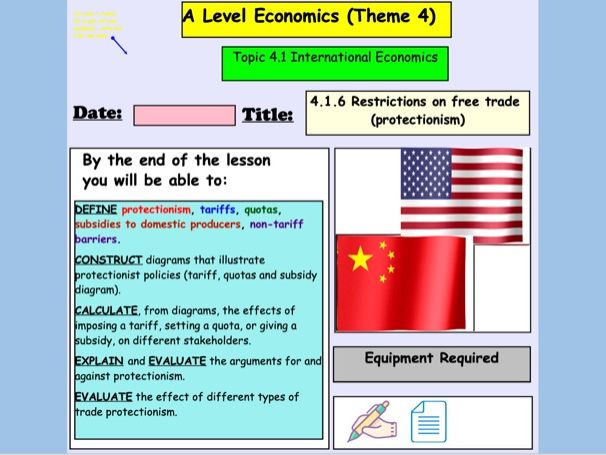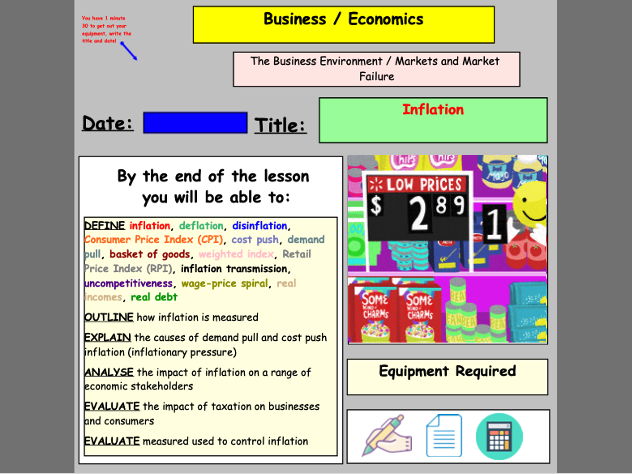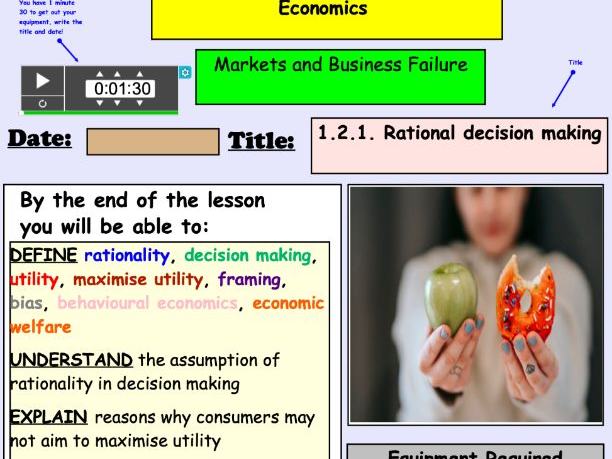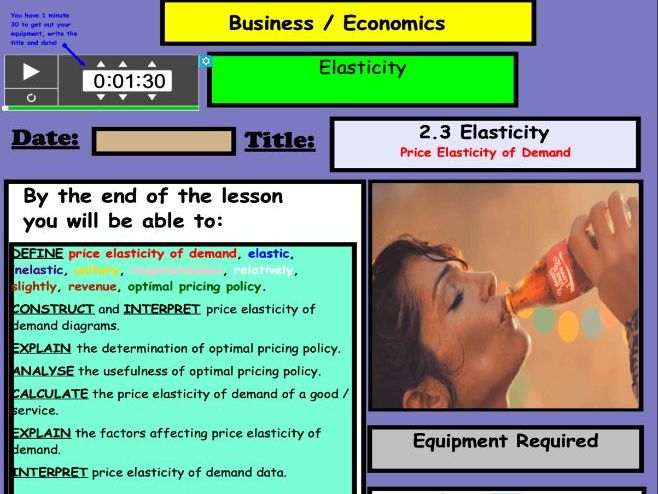84Uploads
10k+Views
6k+Downloads
Economics

Consumer and Producer Surplus
Included in this PowerPoint:
Colourful and engaging slides
Guess the question starter activity with answers (questions and answers cna be changed)
Detailed notes
A range of activities throughout with answers
Step by step demonstrations on how to show and calculate both the consumer and producer surplus
This presentation contains 38 slidea and took me an hour to go through with students

Comparative and Absolute Advantage
This is a complete lesson on comparative and absolute advantage.
The presentation explains both step by step and includes a range of games, activities and questions throughout.
There are also a couple of past paper questions with answers at the back.
A key term editable starter activity is included at the start.
Engaging and colourful throughout.
This presentation contains 45 slides and took me an hour and a half to go through with my students

Price Elasticity of Demand WORKSHEET
A detailed and colourful worksheet designed to test a range of skills covered in this topic. The worksheet contains 6 activities, each taking between 5 and 15 minutes to complete. It took most of my students between 45 minutes and an hour to finish this worksheet. The activities are as follows:
Activity 1 - A fill the blanks activity that test students’ knowledge of the vocal and terminology used
Activity 2 - Calculating PED, percentage changes and recognising the different types of PED
Activity 3 - ‘Developing your answers’ - students need to recognise and explain factors that influence PED
Activity 4 - Revenue boxes
Activity 5 - Diagrams
Activity 6 - More complex calculations / application
ALL ANSWERS ARE PROVIDED IN DETAIL and have been written in a way that is broken down for students to easily understand. I ran this activity as a peer marking exercise and collected everyone’s work at the end of the lesson to check if there were any gaps in understand to review the following lesson. This saved a lot of time!

Economics as a Social Science WORKSHEET
Included in this worksheet:
Activity 1 - Match the key term with the definition based on key terms included in this topic, such as the economic problem, utility and ceteris paribus
Activity 2 - Challenge the economic assumptions (a key skill for an A/A*)
Activity 3 - Select whether the scenario is micro or macro
Activity 4 - Trivia on UK economy in 2024
All answers are included so the activity can be marked by the teacher / peer / self marked
The activity took around 10 minutes for my students to complete

Protectionism (Economics)
A detailed (102 slide) PowerPoint presentation on tariffs, quotas, trade subsidies and other forms of protectionsim.
This presentation includes:
Colourful slides
Videos
Activities
Links to syllabus
A detailed step-by-step instructions on how to draw tariff, quota and trade subsidy diagrams
Homework activities
Contextualised examples

Index Numbers
Complete lesson with additional worksheet on index numbers.
Included in this resource:
Activity on why quantitative skills are important in economics
Explanation of what index numbers are and why they are used
Step by step instructions are to how index numbers are calculated
8 activities on index numbers (all answers included)
This lesson took me an hour and a half to go through with my students

Free, Mixed and Command Economies
The PowerPoint attached is an informative presentation that explains the difference between command, mixed and free market economies.
Contextualised exams provided throughout.
This presentation contains 18 slides and took me 30 minutes to go through

Globalisation / Introduction to International Marketing
Using MCDONALD’S TSUKIMI BURGER, Tesco’s failure to succeed in the US, Apple’s failure to succeed in India, and many others, this PowerPoint seeks to explore the reasons why businesses wish to sell in international markets, the challenges and constraints.
Included in this PowerPoint:
A detailed title page, outlining the key skills covered in this topic
A recap on moving averages with answers. This topic is included in some syllabi earlier in the marketing unit but can be deleted if not required
A starter activity introducing the concept of globalisation where students need to match McDonalds products based on the country whey are sold
(demonstrating how products need to be adapted based on the market they are targeting). Answers are provided
An explanation of reasons why businesses choose to sell products in overseas markets
A contextualised example for each reason
Detailed explanations as to each of the reasons why how marketing activities need to change depending on which country goods are being sold
Video 1: Reasons why Tesco failed in US (poor marketing)
Video 2: Reasons why Apple failed in India (poor marketing)
Introduction to some of the factors that make trade between countries easier
This lesson took me an hour and a half to go through.

Poverty, Lorenz Curve, Gini Coefficient
This presentation contains:
Colourful, detailed and engaging slides throughout
A ‘random name selector’ key term starter activity
7 timed past MCQs on a range of Economic concepts (interactive timer included) All answers included.
Activities throughout
Detailed notes throughout
Explanations of Lorenz Curve and Gini-coeffient
A comprehensive presentation.
There are 65 slides in total and this lesson took me an hour and a half to go through with students

Inflation
Included in this PowerPoint:
A detailed and colourful title slide that outlines the key learning outcomes and equipment required for the lesson
A starter activity where students are required to guess how the price of 5 goods and services has changed over time (closest for each round wins). Students really enjoy this activity
Explanation of why / when inflation becomes a problem, how it affects incomes and sectors where incomes have risen lower and higher than inflation
Explanation in basket of goods / weighted index
Step by step explanation of how inflation is calculated using weighted index
Activity (with answers) where students are required to calculate inflation changes using a weighted index
Activity (with answers) - identify which goods and services have been recently added and removed from the basket of goods
Explanation of difference between demand-pull and cost-push inflation with examples
Diagrams for both types of inflation
Presentation is detailed and colourful throughout
There are 52 slides in total and this presentation took me an hour and a half to go through.

Rational Decision Making
This resource is a 17 slide PowerPoint that explains the concept or rational decision making.
Included in the presentation:
A colourful and informative title slide that outlines the learning objectives
An engaging and interactive online ‘vortex’ starter activity. Students need to match which key term links with which of four topics. Activity is self marked and instructions are included
Explanations of how rational decision making is a principle of neo-classical economics
Contextualised examples of how customers don’t always act rationally (Nudge Theory, Third Decoy, Dopamine, FOMO)
Explanation as to why consumers may not act rationally
This resource took me 30 minutes to complete

Terms of Trade
This colourful and informative resource is fully comprehensive, and includes a number of tasks that test learning that do not require any marking from the teacher.
Included:
A detailed and colourful title screen, outlining the learning objectives and including an interactive timer and picture animations
A ‘guess the question’ starter activity with answers that tests understanding of earlier macroeconomic content
A quiz on UK imports and exports
Detailed explanation of ‘weighted indexes’ with questions and answer scheme included
Past exam question with mark scheme on terms of trade
Link to a video reviewing terms of trade and index numbers
Detailed explanations of factors affecting terms of trade and Prebisch-Singer hypothesis
8 mark question with mark scheme
Homework tasks, including a link to a Teams Quiz with 17 questions on terms of trade. Questions are self-marked when students respond
All resources took me 3 lessons to go through

Economics as a Social Science (Lesson + Worksheet)
This PowerPoint presentation and worksheet has designed based on the Edexcel A Level Specification but can be applied to any exam board.
The PowerPoint includes:
Detailed and colourful title page with animations, auto calendar date, gifs and timer
Starter activity that test students’ understanding of economic terminology they should be familiar with in the news
Detailed explanation of what economics is
Challenging assumption activity
Detail notes
All answers included
The worksheet has 4 activities:
Match important key terms relating to this lesson
Challenge the assumption activity
Micro or macro scenario
UK economy trivia

Human Development Index
A lesson that explains what HDI, how it measured and other measured of development.
Explanations, editable starter activities and videos included

Allocative Efficiency (Economics)
Arguably the trickiest of the efficiencies students need to understand.
This presentation has been designed to break this efficiency down and explain it step by step.
Productive and dynamic efficiency also recapped in a starter activity.
Lots of activities included in the presentation.
Last few slides go through exam technique for 8-markers (Edexcel) with a sample question and model answer

Price Elasticity of Demand
Colourful. Engaging. Informative. This PowerPoint has been creating to introduce students to the concept of price elasticity of demand.
Included in this PowerPoint:
A detailed and colourful title page, highlighting the skills that will be covered over the duration of this topic
A starter activity where students need to rank in order which goods / services would be most to least affected by a change in price
Discussion points
Slides detailing how price elasticity of demand is calculated, with an example
Slides explaining what the numerical values mean (how to interpret them)
Calculation questions with answers
Explanation of the factors affecting price elasticity of demand
This resource took me one hour to go through as a class

Interpreting elasticities worksheet
Attached is a worksheet on PED, XED, YED and PES.
Students need to calculate the values as well as interpret what the values mean, such as whether demand is price elastic or inelastic (PED), or if goods are complements or substitutes (XED), etc.
There are 16 questions in total.
All answers are included, allowing you or the students to review and grade the worksheet.

Economic Growth / GDP PPT AND Worksheet
This resource provides a comprehensive overview of how GDP is used to measure economic growth. Included in this resource:
A colourful and engaging title slide with learning objectives, animations, auto date, timer and bell
Recap starter activity on basic economic vocabulary (tile reveal activity). Answers included.
Detailed explanations of economic growth, GDP, GDP per capita, real GDP, total GDP, GPD value and volume, and GNI
Activities with answers for most of them (guess the price inflation activity for real GDP, GDP inflater activity - both with answers)
Detailed notes
Contextualised examples
Worksheet with tasks linked to PPT content. Activities include past paper questions, calculation activities and a ranking of nominal GDP task
This presentation and worksheet took roughly two hours to complete with my students.

Business Growth (Business and Economics)
Complete resource that explores organic and inorganic growth as well as constraints on growth

Purchasing Power Parity (Economics)
Colourful, engaging and informative lesson on PPP. Resource includes:
Colourful title slide with timer, learning objectives, animations and auto date
Editable recap starter activity on GDP / Economics growth
Step by step guidance as to what PPP through a range of activities relating to currency and exchange rates
A number of games and activities included, with answers
Sample PPP questions
There is a simple worksheet included




















